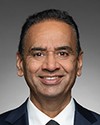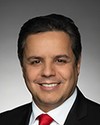Mr. Speaker, we are here to talk about Bill C-12. I am going to focus my speech. As many of my colleagues in the House know, I do a lot of work with our first responders and our veterans. I do a lot of work dealing with mental health throughout our country, so I will be spending a majority of my time talking about fentanyl and how it has had just an incredible, devastating impact on our country.
I would be remiss if I did not do this first. We have first responders all across our country who put their uniforms on every day to run into burning buildings, to run toward danger. Whether it is a nurse, a paramedic, a firefighter or a police officer, they are there to serve us and our families. They are there to make our communities safe.
One of my very good friends, somebody I deeply respect, Mr. Paul Hills, is in Ottawa today and has been here for the last week. I have worked tirelessly, shoulder to shoulder, with him to stand up for our first responders, who face threats of violence and violent acts each and every day. I am just honoured to call him a friend. I know that we are not allowed to acknowledge people in the gallery, so I will not look up to the gallery, but perhaps my colleagues could do me a favour and just provide a round of applause.
He has worked tirelessly to get Bill C-321 passed. The bill would change the Criminal Code to recognize, at the time of sentencing, that if the victim of violence is a health care worker, a nurse or a paramedic, that would be an aggravating factor in sentencing. He has been here working tirelessly with our Senate and with all of our colleagues on all sides. I send my heartfelt thanks to him.
Furthermore, I cannot speak to Bill C-12, about strengthening our borders, if I do not recognize and talk about Brianna MacDonald, whom I have talked about in this House before. At 13 years of age, she lost her life in a homeless encampment due to an overdose. She turned 13 on my son's birthday last year, on July 15, and she was found deceased on my daughter's birthday, a month later, August 23, in Abbotsford in a homeless encampment. Her parents did everything to try to get her off the drug and get her off the streets. She was 13.
We cannot talk about this bill or any bills when we are talking about strengthening our borders or making our communities safe without mentioning Brianna or Tyler Dunlap, or the nephew of our colleague, who mentioned her nephew passed away from an overdose. I lost my brother-in-law to an overdose. I lost my uncle to drugs. I have a brother on the streets now who is gripped with this crisis. I cannot leave that at the feet of the government because he has been on the streets for a long period of time.
However, I ask those who are watching and those who are in the House today to take a look around our communities. Do they look the same as they did 10 years ago? The answer is no. There has been an increase in crime.
Fentanyl flows across our porous border. We are absolutely powerless to stop this drug from flowing across our border. That is why we are standing here to compel our colleagues, to plead with our colleagues across the way in the government, to protect our youth, strengthen our borders and ensure that law enforcement has the tools it needs to stop illicit drugs from reaching our communities. Right now, whatever we are doing, it is not working.
Over 50,000 Canadians have lost their lives since 2016. Those are just the numbers that we know. In my home province of British Columbia, overdose is the leading cause of death for youth ages 10 to 18. I say it in every speech because it bears repeating time and time again. Do members want to know what the second leading cause of death is? It is suicide.
Our country is gripped in a mental health crisis and all we look at are band-aid solutions. That is not blaming the current government or previous governments; it is blaming us collectively as leaders, whether provincial, federal or municipal. We are failing Canadians. Bill C-12 does nothing to affect that.
I was elected 10 years ago on Sunday. One of the first debates I undertook in the House was on the suicide epidemic in Attawapiskat First Nation. I remember listening to the debate and hearing some of our colleagues who had been in the House a lot longer than I had at that point say that their first debate, years earlier, was on the suicide crisis we had in Canada. We have done nothing; they are band-aid solutions.
Collectively, as a Parliament, we passed my motion to bring a three-digit national suicide hotline to Canada: 988. We did that in the last session. However, there is so much more we need to do. When we see Bill C-12 and bills like Bill C-2, an omnibus bill with much ado about nothing, we question why.
Those who are new in the House, I remember being in the same seats as some of them in the back rows of both sides. I came here with great intentions and had great hopes for all, but we are failing. I cannot remember who said it, but one of our colleagues said that the time for talk is done; we need action.
Over seven and a half million Canadians are without a doctor. Our borders are broken and we are going to bring more immigrants into Canada, but they are not going to be able to get a doctor. They are not going to be able to afford food. They are not going to be able to afford a house or a roof over their heads. Where is the compassion in that?
Our police officers and first responders are taxed. How far are we falling when it is okay to firebomb an ambulance, to stab a paramedic or to knock a nurse out when they are just trying to help us, heal our broken bones or hold our hand as we take our last breath?
I challenge all of our colleagues here. We get heated during question period, but when we talk about things that matter, like the mental health of Canadians, the health and wellness of Canadians, I think we could all agree that there is no health without mental health and that our addiction crisis is real. Bill C-12 does nothing to stop the scourge of fentanyl, drugs or guns coming over our borders.
We can do better. The government needs to do better. The provinces are calling for it. The attorneys general are calling for it. The municipalities are calling for it. The police agencies are calling for it. I challenge all of us, but I challenge the government, because that is its legacy after 10 years. It says it is new, but it is the same old, same old. I know there are good people on that side, so I challenge them to speak up, those members, those colleagues, and to challenge the guy in the front desk to do better and be better.














